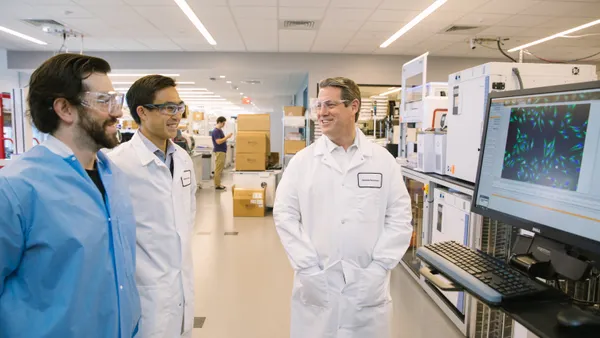MeiraGTx has formed another partnership with a large drugmaker, this time striking a deal that hands Eli Lilly rights to an experimental gene therapy for an inherited eye disorder.
Lilly will pay MeiraGTx $75 million up front for exclusive rights to the therapy, which targets an ultra-rare, blinding condition called Leber congenital amaurosis-4. MeiraGTx could receive another $400 million as well as royalties if the treatment, AAV-AIPL4, hits certain research and commercialization targets.
The deal also grants Lilly access to MeiraGTx’s gene therapy tools and certain rights to its “riboswitch” gene-regulating technology, all of which will be used to develop treatments for eye conditions.
The partnership “provides the opportunity for these innovative technologies to be used much more broadly than we have the capacity to do alone, and in that way, reaching more patients and transforming more lives,” Alexandria Forbes, MeiraGTX’s CEO, wrote in an email to BioPharma Dive.
MeiraGTX’s program is already on the verge of a regulatory review. Results presented earlier this year and published in The Lancet showed that AAV-AIPL4 helped restore visual function in all 11 patients — children who were born legally blind — who received it in a small trial. In August, the company said it was discussing “expedited approvals” of the therapy in the U.K. and U.S., and intended to submit applications in the fourth quarter.
In a February research note, Raymond James analyst Christopher Raymond called AAV-AIPL4’s results a “showstopper” and “important validation” for MeiraGTx’s gene therapy work. But even if successful, the program wasn’t likely to be a major revenue driver for the company, as the condition only affects one in every million live births, he wrote.
Still, Wall Street analysts have speculated that AAV-AIPL4 might be a beneficiary of a new Food and Drug Administration pilot program that promises drastically quicker regulatory reviews. Commissioner Martin Makary has publicly expressed support for pediatric blindness programs, and one initial voucher recipient was working on another for a rare form of vision loss.
Lilly would now reap the rewards should that occur. While the big drugmaker is best known for its diabetes and obesity drugs, it’s made genetic medicine a priority in recent years through a series of acquisitions. With the MeiraGTx deal and a recent buyout of Adverum Biotechnologies, two of those investments have involved eye disease treatments.
“Ophthalmology is an emerging area of interest for Lilly,” said Andrew Adams, the group president of Lilly’s molecule discovery division. “We are excited to partner with MeiraGTx to bring transformative treatments to patients around the world suffering from eye diseases, starting with AAV-AIPL1, which has shown the unprecedented ability to restore vision in children who were born legally blind.”
MeiraGTx previously brokered deals with Johnson & Johnson and Sanofi. In 2023, it sold its remaining stake in a therapy for X-linked retinitis pigmentosa to development partner J&J. That program missed the main goal of a late-stage study, but MeiraGTx has still expressed optimism about a potential approval filing given other positive trends observed in testing, analysts have noted.
A partnership with Sanofi, meanwhile, is focused on immune, neurological and metabolic diseases.
MeiraGTx also spun some of its neuroscience and obesity work into a joint venture called Hologen Neuro AI.















